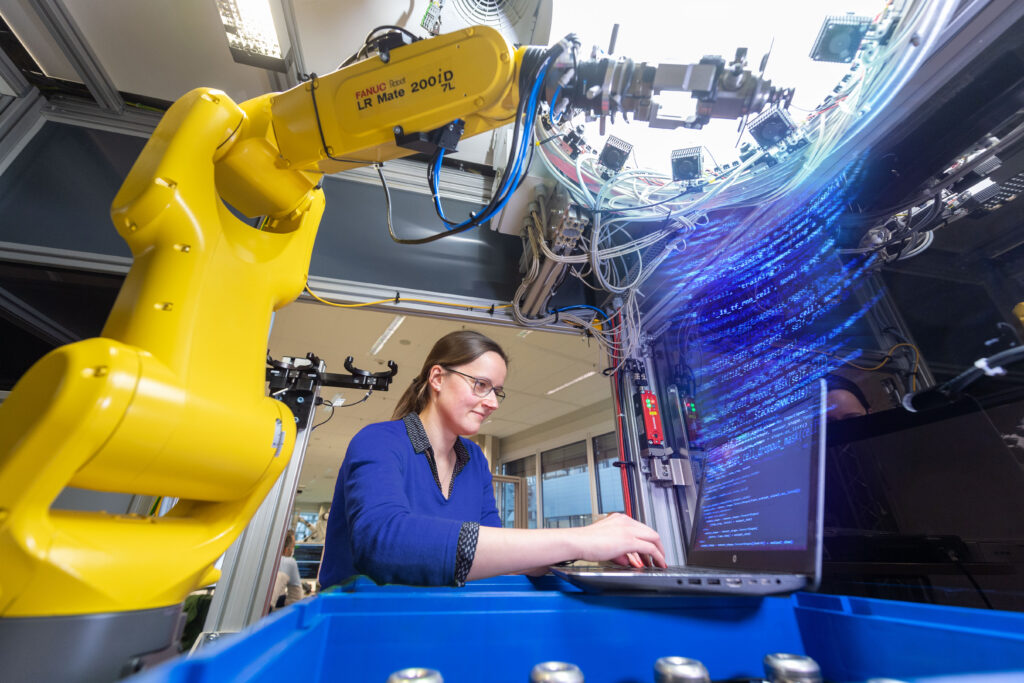
Bosch implements generative AI in manufacturing to improve efficiencies
December 7, 2023
By Manufacturing AUTOMATION
 In initial projects in two Bosch plants in Germany, generative AI creates synthetic images in order to develop and scale AI solutions for optical inspection and optimize existing AI models. (Photo: Bosch)
In initial projects in two Bosch plants in Germany, generative AI creates synthetic images in order to develop and scale AI solutions for optical inspection and optimize existing AI models. (Photo: Bosch) Bosch has shared in a press statement that it is piloting generative AI and foundation models in manufacturing.
In initial projects in two Bosch plants in Germany, generative AI creates synthetic images to develop and scale AI solutions for optical inspection and optimize existing AI models. Bosch expects that this will reduce the time needed for planning, launching, and ramping up AI applications from the current six to twelve months to a few weeks. Following successful piloting, this service for generating synthetic data is to be offered to all Bosch locations.
“Nearly half of all Bosch plants are already using AI in their manufacturing operations. With the help of generative AI, we’re not only improving existing AI solutions, but we’re also laying the foundations for the optimum take-up of this future technology in our global manufacturing network,” says Stefan Hartung, chairman of the board of management of Robert Bosch GmbH.
“AI has excellent potential for innovation and can make human work even more productive. As a manufacturing company, established factory outfitter, and Industry 4.0 trendsetter, Bosch aims to play a leading role in the development and application of industrial AI,” Hartung says.
Bosch shares in its statement that its pilot plants are already using AI in production scheduling, monitoring, and control. At its plant in Hildesheim, for example, AI-based data analysis has helped reduce cycle times during the production ramp-up of new lines by 15 percent. At its plant in Stuttgart-Feuerbach, new algorithms cut component-testing processes from three and a half to three minutes.
“With generative AI, we’re now taking the next step in the evolution of artificial intelligence and advancing modern manufacturing to a new level,” says Tanja Rueckert, member of the Bosch board of management and chief digital officer. In this process, Bosch can build on its own expertise: the software models for generative AI were developed by Bosch research and are now being implemented in the field by Bosch factories. One plant uses an AI method of synthetically generated images to reliably inspect welds of copper wires in electric motor production, while another focuses on the quality assurance of high-pressure pumps.
The company shares that for years, its Feuerbach plant inspected fuel-injection components manually. The new approach is a scalable generative AI that recognizes variants of a product and error patterns and takes into account different arrangements and sequences in the production process. This is based on a foundation model developed by the company’s research and fed by large data sets from its manufacturing network. Synthetically generated data is used to refine the model and customize it for on-site applications. This is expected to make the AI capable of inspecting components independently, only submitting cases to visual inspectors where it is unsure.
At the Hildesheim plant, synthetically generated images have reportedly been successfully used for training purposes in the first standard systems in electric motor production. The plant expects that project duration will be six months shorter with the new approach than with conventional methods, leading to annual productivity increases in the six-figure euro range. Bosch plans to expand the AI approach to other locations. “In our work to develop AI solutions, we’re unlocking the potential offered by the Bosch manufacturing network and its roughly 230 plants. And we are using new technologies. Generative AI helps to harmonize individualization and scaling – the technology gives us the best of both worlds,” Rueckert says.
Advertisement
- Motion Industries appoints Mike Esposito as group vice-president of Motion Automation Intelligence
- Universal Robots launches new 30 kg payload collaborative robot – UR30